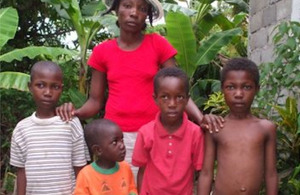DFID Research: Putting child trafficking on the agenda in Haiti
Panos Relay helps young journalists tell the story of child trafficking in Haiti.

Merancia Michel and her four sons. Merancia is a survivor of human trafficking in Haiti. Picture: Wildor Saintus, Panos
In 2009, Panos London’s Relay programme, funded by DFID, extended activities to Haiti in partnership with sister organisation Panos Caribbean. “Our aim is to work to ensure that poor and vulnerable communities affected by issues under research are able to communicate their stories, contribute to research agendas and research projects and have increased capacity to influence and participate in policy formulation,” says Dawn-Marie Roper, Panos Caribbean Relay programme co-ordinator.
Child trafficking in Haiti was identified as a critical issue. The International Organization for Migration estimated that there were 100,000 children in Haiti working as restaveks (2008). These are children sent by poor rural families to richer urban families to receive care and education in return for domestic work. However they are often exploited and used as slave labour. In addition thousands of children are trafficked across borders and sold for sex and labour in the Dominican Republic and the Bahamas.
Community leaders in Pilate a remote town in the north of Haiti noted a lack of public awareness about the scope and nature of the issue and its damaging effects. Meanwhile research in the region and informed policy were lacking.
To address this, Panos Caribbean trained 15 young people to act as journalists and record in-depth interviews with families in Pilate to understand and document the issue. The youth journalists were trained in interviewing skills and informed about current research on the issue by Mr Gracien Jean, a researcher from the International Organisation for Migration in Haiti. They found that while many of those who had first-hand experience of child trafficking recognised its dangers, others believed that it was a way to improve their children’s lives.
“Some people interviewed think that child trafficking is a practice that the Haitian Government should prohibit, because many of them lost their children. They are victims. But for many others it is a ‘deliverance’ to send their children to the Dominican Republic to have a better life,” says Valiola Monfiston-Jeune of Panos Caribbean.
The testimonies revealed that many people did not see trafficking as a problem. “I think these people are disempowered and do not see that they are being exploited. They don’t have information on what is happening to their children and are not aware of how underlying socio-economic factors influence their decisions. They could benefit from good research on this issue, to see the wider picture. It is vital that research and policy is attuned to their realities, attitudes and experiences if this issue is to be seriously addressed,” says programme co-ordinator, Dawn Marie Roper.
Following the interviews, the youth journalists produced six radio broadcasts on child trafficking for Radio Echo in Pilate to increase awareness and foster community debate.
Following the devastating earthquake in Haiti on 12th Jan 2010 the issue of child trafficking has received international attention. Children that have been separated from parents and carers as a result of the earthquake are more at risk of being trafficked, a UK-based newspapers reported. Since the earthquake, people from around the world have submitted adoption requests for Haitian orphans and many NGOs fear that this could encourage child trafficking networks. The NGOs have called for adoption requests to be slowed down as the children may still have relatives looking for them.
Although Panos Caribbean’s Port-au-Prince office was destroyed by the earthquake, fortunately the staff have survived, though most are homeless. They are now assessing the feasibility of planned project activities. Despite the crisis, Panos colleagues in Haiti have stressed the importance of addressing the issue of child trafficking now more than ever.
They have plans to organise a discussion forum for researchers and policymakers in Haiti in 2010. The youth journalists will develop creative presentations pulling out important messages from the interviews and incorporating powerful direct quotes and photographs to highlight the issues raised by the community. The discussion forum aims to inform research and policy agendas, to ensure that information and action takes account of and responds to the needs of the victims of child trafficking.